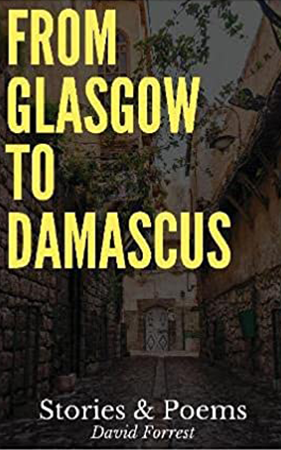From Glasgow to Damascus – Stories and Poems by David Forrest is published by Palewell Press. May 2021.
In From Glasgow to Damascus David Forrest weaves a narrative of friendship amid a catastrophe of war. This booklet—fifteen poems, prose poems, and nonfiction narratives—elicits thoughts of how strange humanity is when it comes to war; how the killing of human beings by other human beings happens over and over, whether it is violence committed through acts of the state, like Syria, or through acts of terrorist groups, like Al Qaeda and Boko Haram. These acts of war and terrorism embed themselves in a structural violence that replicates like a virus in the modern world. Perhaps, even, when you think about it, they are the same thing—one variant begets the other.
What is to be done about this violence that goes by the name of war or terrorism? This question is simple enough to pose but difficult to answer. Perhaps there is no answer that would ensure the obliteration of acts of war and terrorism. Perhaps it is all we can do to find within ourselves those acts of courage that mitigate, if not extinguish, these acts of violence. After all, people all over the world do not go to war, do not commit acts of terrorism, do not commit violent acts.
People all over the world do, however, prevent war and violence from happening. Some of these people start with the basics: perceiving people who flee war as friends, not as unwelcomed refugees. This is where poets and writers help in basic ways and, specifically, how the work in From Glasgow to Damascus shows human beings behaving generously and courageously toward one another, breathing life-giving sustenance to those who are besieged by war and terrorism.
Reading From Glasgow to Damascus, we feel the presence of those who have been through the Syrian war and who now live in Glasgow, not as “economic migrants or asylum seekers or international students,” or as refugees, but as friends. These Syrian friends share their perspectives with Forrest, challenge him, make him think differently, and show him true friendship, closing any distance they might feel between them. Forrest’s work in this booklet, then, comprises his reflections “inspired by friends.”
The first entry in From Glasgow to Damascus is “Echoes and Walls,” a prose poem that creates tension between mood, the literary element that creates atmosphere, and voice, the literary element that reveals a pervasive presence that is woven throughout the prose poem. We readers may assume that the voice in the poem is the poet who is conversing with a man from Syria; perhaps the man is a recent acquaintance or a friend that Forrest has known for a few months or maybe longer.
Whatever the length of time they have spent together, these two men have a meaningful and empathetic exchange on Saturdays, an exchange that creates the mood of the poem. The poet asks about Damascus, how things are, and the friend says they are fine. The following Saturday, the poet wants to know if his relatives are safe, and the friend says they are safe. They go for a walk the next week, and the poet asks again if things are okay back home. The friend answers, “Not good.” He’s afraid the twelve people staying in his parents’ flat will go hungry; his father refuses to leave Syria; the police picked up his uncle a month ago. The reciprocal conversations are the mainstay of the poem, each one building on the other until the next Saturday, when the man tells the poet that he feels guilty because he has food to eat and the lights are on. Then, the silent irony that is present in the deeper layers of the poem punctuates the mood in the final stanza when the Syrian friend empathizes with the poet, asking if he wants to talk over his nervousness about a job interview the following week.
“Echoes and Walls” is the introductory poem that sets the mood and the voice for the following mix of fourteen poems, prose-poems, and nonfiction narratives—friend talking to friend—but “Echoes and Walls” also foreshadows the brute force of war. Whenever the poet or the speaker in From Glasgow to Damascus refers to the bombings, the rubble, the dead, Forrest is circumspect: “When you write about Syria you must leave things out.”
This review wouldn’t be complete without highlighting “Mo,” a prose poem about a master storyteller and comedian who can entertain a packed audience for an hour. He is quiet about his country, Syria, but if someone asks him—“Isn’t there a war there?” or “Are your family safe?”—he says politely, “Yes, they are ok, thank you for asking, they’re in another part of the country.” His answers are untruths. Still, people believe him. To Forrest, however, Mo, a Syrian man who has found a home in Glasgow, one word describes him. “The word is Habib in Arabic. Friend in English.”
In “Echoes and Walls” and “Mo,” readers vicariously experience Forrest’s friendship with the Syrian people. He meets Syrians who help him reflect on the war in Syria, and over a period of eight years, Forrest and his Syrian friends have built deep friendships. It is not a coincidence that the title of Forrest’s booklet is From Glasgow to Damascus.






